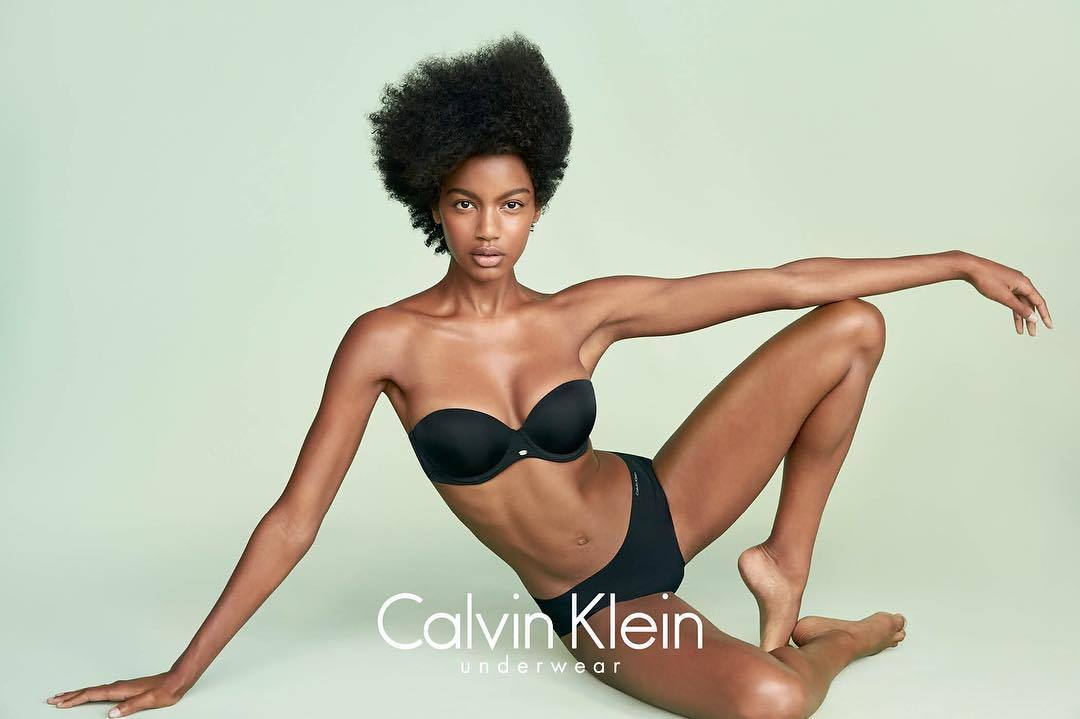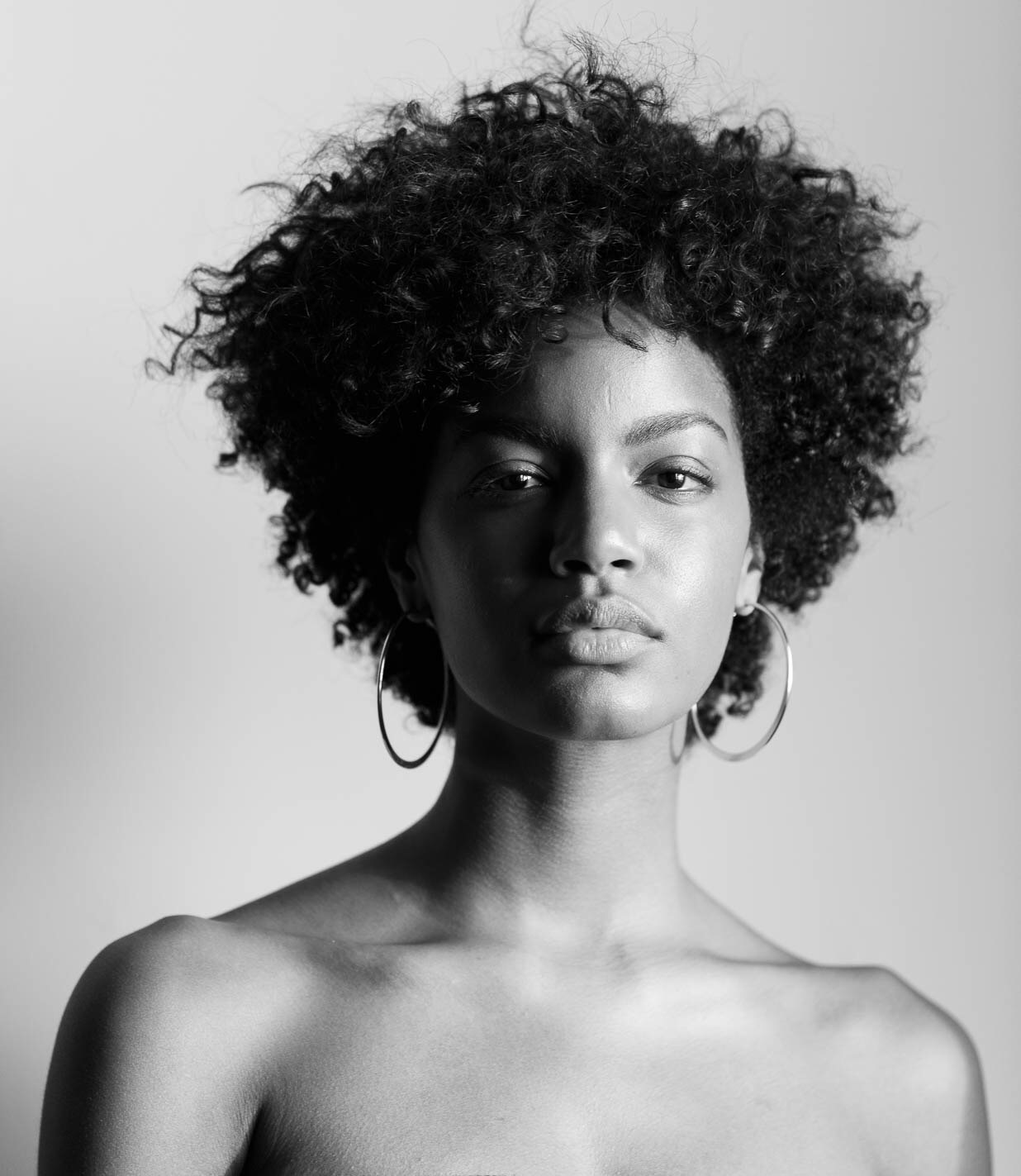Ebonee Davis has always dreamed of being a model. Scratch that: she wanted to be a supermodel — like the tall, thin blue-eyed, blonde-haired beauties she saw on billboards and TV. Born and raised in Seattle, Ebonee moved to NYC to pursue her dream after graduating from high school. At the time, Davis was told that black models either had to conform to Eurocentric standards of beauty (i.e. straight hair, parted down the middle) or instead embody a Westernized notion of the exotic. Basically, they had to be the right kind of black, otherwise they could kiss their careers goodbye. So she went along with the former until she could no longer take it, which is when she finally ditched her weave and wore her hair au natural.
Two years later, she’s already booked two campaigns for Calvin Klein, appeared in a short video for L’Oreal, and made her catwalk debut for Yeezy spring/summer 17. She also made waves last summer when she published an open letter to the fashion industry imploring designers, model agents, makeup artists, and magazines to change their attitudes when it comes to inclusivity and cultural accountability. Working towards her first ever TED Talk, we speak to the model turned activist about fashion, diversity, and remaining true to who you are.

Growing up, who were your role models?
I don’t know if I had any role models in the fashion industry. The only prominent black models I remember growing up are Tyra Banks and Naomi Campbell, and I couldn’t really relate to them. They looked like life-size Barbies and I had kinky hair and brown eyes. Rappers and R&B singers were way more influential to me. I always loved Tupac, how outspoken he was, and how he used his platform to speak about social justice. I love Lauryn Hill for the same reasons. They are my role models for sure.
What was your relationship like with your appearance growing up and how has it changed over the years?
As a child I would look at myself for hours and think how much more beautiful I would be if my eyes were blue or green, or if my nose and lips were a little smaller, or if my hair grew a little longer; I hated the way I looked. Over the years, I spent thousands of dollars at salons getting my hair relaxed and straightened and thousands more on weaves and extensions to make my hair appear fuller and longer. Now I am proud of who I am and what I look like and I am very vocal about that pride. I realized that beauty doesn’t have one definition.
What is most exciting part of working in fashion?
I’m excited whenever I get the opportunity to break down a wall or do something I was told I couldn’t do.
What’s been your most memorable career moment?
Seeing my Calvin Klein campaign on a billboard in Soho just months after being told by my agents that I would never get work with natural hair.
When you first started out as a model, you tended to conform to industry standards of beauty. How did it feel to compromise who you were?
I was told that the only black models in the industry who work either looked like they’d been plucked out of a remote village in Africa, or looked like a white model dipped in chocolate and since I wanted to work, I assimilated. I think the word kind of implied that I had some sort of “choice” in the matter— to cave in or to stand my ground. When in reality, I didn’t. There was no alternative at the time. Either straighten my hair or don’t work. That was the reality I faced.
What prompted you to write your open letter a year later?
The day Alton Sterling was murdered by police last summer I went home and wrote a letter to the fashion industry, emphasizing the duty fashion media has to help change the perception of black people. No longer could I remain silent; and I realized that existing simply wasn’t enough. It is the same lack of value for black lives and refusal to see us as equal that excludes us from fashion and causes black women and men to be gunned down in the street.
What positive changes would you like to see in the industry?
Inclusion, understanding, and consciously creating imagery that represent all people. I want to see more models of color represented by agencies and more models of color on magazines and high-end fashion. I want to see more models of color on runways. I want the fashion industry to reflect what America actually looks like.
Diversity has become part of the cultural conversation like never before. Why do you think this is?
People are just ready for a change. I noticed a huge shift when Instagram got popular. People in the industry realized the power of hiring people who represent a broader definition of beauty. Also, the current state of our democracy. People are more open to having these sorts of conversations, it doesn’t make sense not to.
Is there a danger of diversity becoming a trend, something cool that big brands can exploit for personal gain? Does it even matter if you’re still disrupting the norm?
I sometimes worry that black people are just looked at as cash machines. American culture is black culture, we create so much of what becomes mainstream, and often our ideas and talent are exploited, especially because we don’t have the same resources and power as large brands and corporations. I think we are looked at for our monetary value instead of our value as human beings so this presents a moral conflict for me — someone who has to work with brands but who also realizes that brands exploit labor and bank off of young black talent.
I am happy, however, that I can be the reason why someone feels beautiful and represented and empowered. In being present in the industry, we are awakening people’s consciousness. Black people and people of color who have been repressed for so long are now accepting who they are and with self-acceptance comes self-fulfillment. It’s a double edged sword, but it won’t be like this forever. Not if we continue at the rate we are going now — black people are creating their own opportunities and industries.
Why is it so important to use one’s platform?
Because, as models and role models, we are responsible for how people view themselves and how people view the world. Whether we realize it or not we are influencing and shaping an entire generation of people and through creating and sharing conscious content, we can help to ensure that we are doing this in a positive way. Everybody has a story but not everybody has a voice or a platform, so we have to step up and be leaders and speak for those who are underrepresented, misrepresented, ignored, and bullied.
Credits
Text Tish Weinstock
